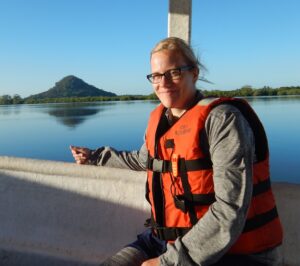Biography
Currently, Dr. Wilkins runs the Eco-Evolutionary Interactions Group at the Max Planck Institute for Marine Microbiology in Bremen. She cares about diversity, creativity, and an inclusive environment in academia. “The MPI in Bremen offers the necessary resources and network to reach our scientific and community-driven goals. We are very excited to be part of the Max Planck Family and the only Max Planck Research Institute of Marine Research.” (L. Wilkins, May 16th, 2022)
Education and positions held
- 2022-present:
- Max Planck Research Group Leader, Max Planck Institute for Marine Microbiology, Bremen, Germany
- 2021-present:
- Marie Skłodowska-Curie Individual Postdoctoral Fellowship.
- 2020-2022:
- Project Scientist, Department of Symbiosis, Max Planck Institute for Marine Microbiology, Bremen, Germany; hosted by Prof. Dr. Nicole Dubilier.
- 2020-present:
- Co-Founder and Co-Chair of the ISME (International Society for Microbial Ecology) Early Career Scientist Committee.
- 2018-2020:
- Gordon & Betty Moore Foundation Postdoctoral Researcher, UC Davis, USA, hosted by Prof. Dr. Jonathan A. Eisen.
- 2017-2018:
- Founder and Co-President of the Berkeley Spouses, Partners and Parents Association (BSPPA), UC Berkeley, USA.
- 2016-2018:
- SNSF Postdoc, University of California, Berkeley, USA, hosted by Prof. Dr. Stephanie Carlson.
- 2014-2016:
- SNSF Postdoc, University of Lausanne, Switzerland, hosted by Prof. Dr. Claus Wedekind.
- 2010-2014:
- Ph.D. in Ecology & Evolution, University of Lausanne, Switzerland, hosted by Prof. Dr. Claus Wedekind and Dr. Luca Fumagalli.
Research Summary
As oceans undergo major changes due to human activities, understanding how animals and plants adapt to a changing environment is now more than ever one of the biggest questions in marine biology. To predict future responses, we can explore the past and use geological events, which provide valuable insights into adaptive mechanisms because these events were major drivers of evolution. The formation of the Isthmus of Panamá separated a previous, ancient ocean and all of its marine life into the Pacific Ocean and the Caribbean Sea. These two oceans have developed into very different habitats. Closely related populations that were separated by the Isthmus either went extinct or had to adapt to diverging environmental conditions. Therefore, the Isthmus system offers an ideal opportunity to explore drivers and processes of speciation, diversification, and adaptation through a convergent evolutionary framework. Lucinid clams are globally distributed and live in environments that are characterized by the accumulation of organic matter in the sediment. Lucinids of the genera Ctena and Codakia are of particular interest to our group because these genera harbor sister species pairs that were separated by the closure of the Isthmus of Panamá. Our group is closely collaborating with researchers in Central America, Guadeloupe, California, Hong Kong, Austria, and also with researchers at the Max Planck Institutes in Mainz and Cologne.
Key publications
- Leray*, M., Wilkins*, L. G. E., Apprill, A., Bik, H. M., Clever, F., Connolly, S. R., De León, M. E., Duffy, J. E., Ezzat, L., Gignoux-Wolfsohn, S., Herre, E. A., Kaye, J. Z., Kline, D. I., Kueneman, J. G., McCormick, M. K., McMillan, W. O., O’Dea, A., Pereira, T. J., Petersen, J. M., Petticord, D. F., Torchin, M. E., Vega Thurber, R., Videvall, E., Wcislo, W. T., Yuen, B., and Eisen, J.A. 2021. Natural experiments and long-term monitoring are critical to understand and predict marine host-microbe ecology and evolution. PLoS Biology 19(8): e3001322. doi:10.1371/journal.pbio.3001322 (*shared first authorship) [OA = Open Access].
- Osvatic*, J. T., Wilkins*, L. G. E., Leibrecht, L., Leray, M., Zauner, S., Polzin, J., Camacho-García, Y., Gros, O., van Gils, J. A., Eisen, J. A., Petersen, J. M., and Yuen, B. 2021. Global biogeography of chemosynthetic symbionts reveals both localized and globally distributed symbiont groups. PNAS 118(29). doi:10.1073/pnas.2104378118 (*shared first authorship) [OA].
- Wilkins*, L. G. E., Leray*, M., O’Dea, A., Yuen, B., Peixoto, R., Pereira, T. J., Bik, H. M., Coil, D. A., Duffy, J. E., Herre, E. A., Lessios, H., Lucey, N. M., Mejia, L. C., Rasher, D. B., Sharp, K., Sogin, E.M., Thacker, R. W., Vega Thurber, R., Wcislo, W. T., Wilbanks, E. G., and Eisen, J. A. 2019. Host-associated microbiomes drive structure and function of marine ecosystems. PLoS Biology 17(11): e3000533. doi:10.1371/journal.pbio.3000533 (*shared first authorship) [OA].
- Wilkins*, L. G. E., Ettinger*, C. L., Jospin, G., and Eisen, J. A. 2019. Metagenome-assembled genomes provide new insight into the microbial diversity of two thermal pools in Kamchatka, Russia. Scientific Reports 9(3059). doi:10.1038/s41598-019-39576-6 (*shared first authorship) [OA].
- Wilkins, L. G. E., Fumagalli, L., and Wedekind, C. 2016. Effects of host genetics and environment on egg-associated microbiota in brown trout (Salmo trutta). Molecular Ecology 25(19): 388-394. doi:10.1111/mec.13798

